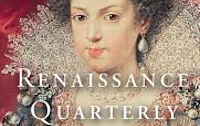
MODE mentioned by Kate Van Orden (Harvard University) in a Review Essay published in Renaissance Quarterly: “Recent Trends in the Study of Music of the Fourteenth, Fifteenth, and Sixteenth Centuries” (Authors: Elizabeth Eva Leach, David Fallows and Kate Van Orden), Renaissance Quarterly, Vol. 68, No. 1 (Spring 2015), pp. 187-227, at 219-220.
“Digital critical editions [...] can present alternate readings via visualization tools that allow users to view the variant passages in question simply by clicking on the score. Two projects lead the way in deploying this new technology: the Marenzio Online Digital Edition, a digital edition of Luca Marenzio’s Italian madrigals and canzonettas, and Les Chansonniers de Nicolas Duchemin, a digital edition of sixteen chanson anthologies printed in Paris by Nicolas Du Chemin between 1549 and 1568.
It is no exaggeration to say that the Marenzio Online Digital Edition, directed by Mauro Calcagno and Giuseppe Gerbino, is reinventing the nature of critical editions. A key element of their innovations is the development of an optical recognition application for early music prints, part of the software application called Aruspix, created by Laurent Pugin. Like OCR (optical character recognition), which accelerates data entry and is the first step toward rendering scanned texts searchable, the Marenzio edition begins by transcribing sixteenth-century prints of Marenzio’s music using special OMR (optical music recognition) software. Additional tools allow editors to collate the sources digitally and users to visualize variant readings simply by clicking on individual notes, which bring up scans of the original sources.
[...] These projects represent more than the latest evolution in editing, for they grapple with music’s ephemerality as a textual form. Lost Voices recovers the quickly forgotten losses that receive only passing mention in modern editions, whereas the Marenzio Edition heightens users’ awareness of misprints, multiple editions, stop-press corrections, manuscript emendations, and the profusion of print. Both unsettle sedimented concepts of the work and authorial agency, remaking music into a dynamic object that resists the static fixity of paper editions and allows users to visualize the interventions of printers and performers. These digital projects help us see how badly suited music has always been to capture in the form of books designed for verbal texts. At the same time, the new sociabilities established by the collaborative editing of the Lost Voices project allow us to reflect on the sense of unboundedness that attended the production of those original prints and their release into growing economies of piracy, knockoff editions, and fakery.”